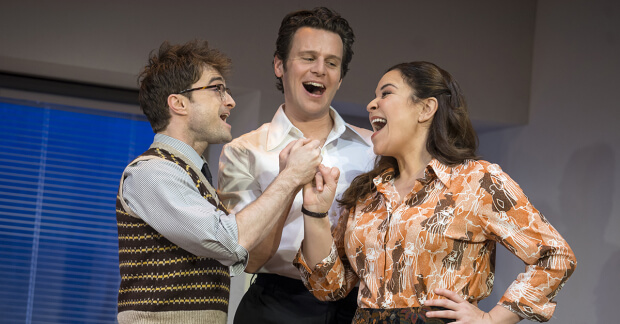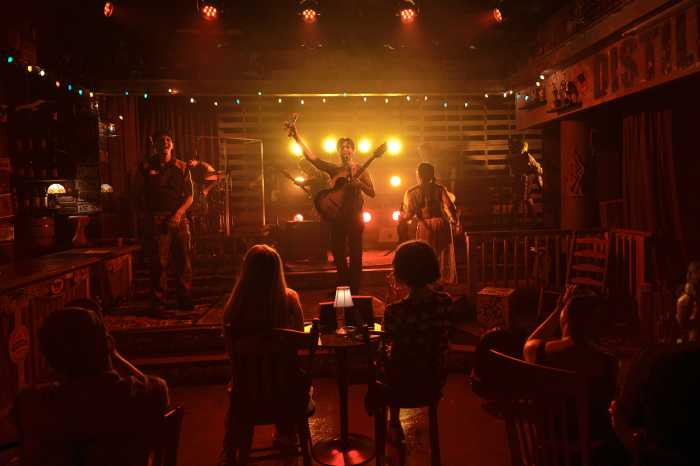“Merrily We Roll Along” has grown up. The 1981 Stephen Sondheim and George Furth musical was one of Broadway’s historic bombs. With a story that works in reverse from middle-aged cynicism to youthful optimism, the original was a heavy lift for audiences, and the cast of mostly 20-somethings for all their earnestness didn’t have depth to match the demands of the book. It lasted through only 16 performances (and 52 previews), and through a quirk of circumstance, I saw six of those and was in the orbit of the production. As a young man, I loved it from the brassy overture to the final “Our Time,” but even then it was obvious the show had problems.
The score, however, wasn’t one of them, and beyond beloved; it’s revered. That’s why in recent years so many well-meaning productions have tried to rescue the show, with mixed results, at least until now.
The new production at New York Theatre Workshop, while not perfect, comes closer than any of the other recent mountings and solves many of the problems of the original and, most importantly, finally makes emotional and dramatic sense. The book has been pared down, and it’s now tightly wound, which gives it urgency and excitement from the first moments. It opens as a biting satire and ends as a “meet cute,” borderline sappy, Hallmark movie. In doing so, it becomes a trenchant commentary on fame, fortune, art, and the prodigious toll getting through it all takes on our spirits. It is not — and never has been — a happy show, but it is finally moving and richly realized theater.
In addition to edits in the book, a sharper eye on the characters and a fluidity that has eluded other revivals, this production succeeds so well because of the cast. Jonathan Groff is Franklin Shepard, the once idealistic composer who turns into a schlocky, but rich and famous, movie producer. Daniel Radcliffe is Charley Kringas, his best friend and collaborator who has taken the path of a serious dramatist, and Lindsay Mendez is Mary Flynn, their longtime friend, cheerleader, and referee. Each of them brings depth and complexity to their characters, who while being very difficult people, are sympathetic. Anyone who has experienced the roller coaster ride of decades-long friendships, how they change, and the conflict between history, “how we were,” and the realities of “how we are,” or “what we’ve become,” will relate. Groff, especially, plays the Frank’s discontent, disquiet — and even mourning — for what was loss with precision and subtlety. Radcliffe, too, has an edgy subtext and barely suppressed anger. Mendez, for all Mary’s sharp wit and scalding candid observations, still suffers with unrequited love for Frank. These are three people whose lives haven’t turned out the way they imagined it when they met on a rooftop to watch Sputnik in 1957 and felt that the future belonged to them. It is a messy, chaotic, and costly love story, which, of course, is what makes it fascinating.
Even with reduced orchestrations, the score sounds as great as it always has, and the three leads sing it beautifully. The rest of the company plays secondary characters and functions as a chorus, setting the time for the scenes as the story moves backwards. Standouts are Katie Rose Clark as Beth, Frank’s first wife, Reg Rogers as Joe Josephson, Frank and Charley’s first producer, and Krystal Joy Brown as Gussie Carnegie, as Joe’s secretary who becomes his first wife, a Broadway star, and Frank’s second wife in a relationship that’s crumbling as the show opens. As with the three main characters, Friedman’s direction is pointed and focused. There is no confusion about who these people are (a challenge in the original), and the overall sense of loss each of them experiences is present — and poignant.
The themes of unanticipated consequences, loss, and coming to terms with the harsher truths of reality is a recurring theme in Sondheim’s work. Six years after “Merrily,” “Into the Woods” would take up these issues in the context of classic fairytales. (The current Broadway revival is well worth a visit.) Even in earlier works such as “A Little Night Music,” Sondheim casts a characteristically cold eye on our common romantic notions, as an inescapable, if impractical, part of the human condition. In this production of “Merrily,” the word itself seems sardonic and jarring…just the way it should be for exciting theater.
This production has had more than ten years to evolve. It began in London in 2012, was filmed for distribution in movie theaters the following year, bowed in Boston in 2017, and has finally found its way to New York Theatre Workshop. And, as recently announced, is on its way back to Broadway next year. Seeing this fabulous flop reimagined and finally a major hit has been worth the wait.
Merrily We Roll Along | New York Theater Workshop | 79 E 4th Street | Tues-Thurs 7 p.m.; Weds 1 p.m.; Fri, Sat 8 p.m.; Sat, Sun 2 p.m., through January 22 | Regular tickets sold out. Daily cancellation line $145, Daily lottery on TodayTix app $25, and resale tickets online. Broadway transfer, Fall 2023 |2 hours, 45 mins, 1 intermission































